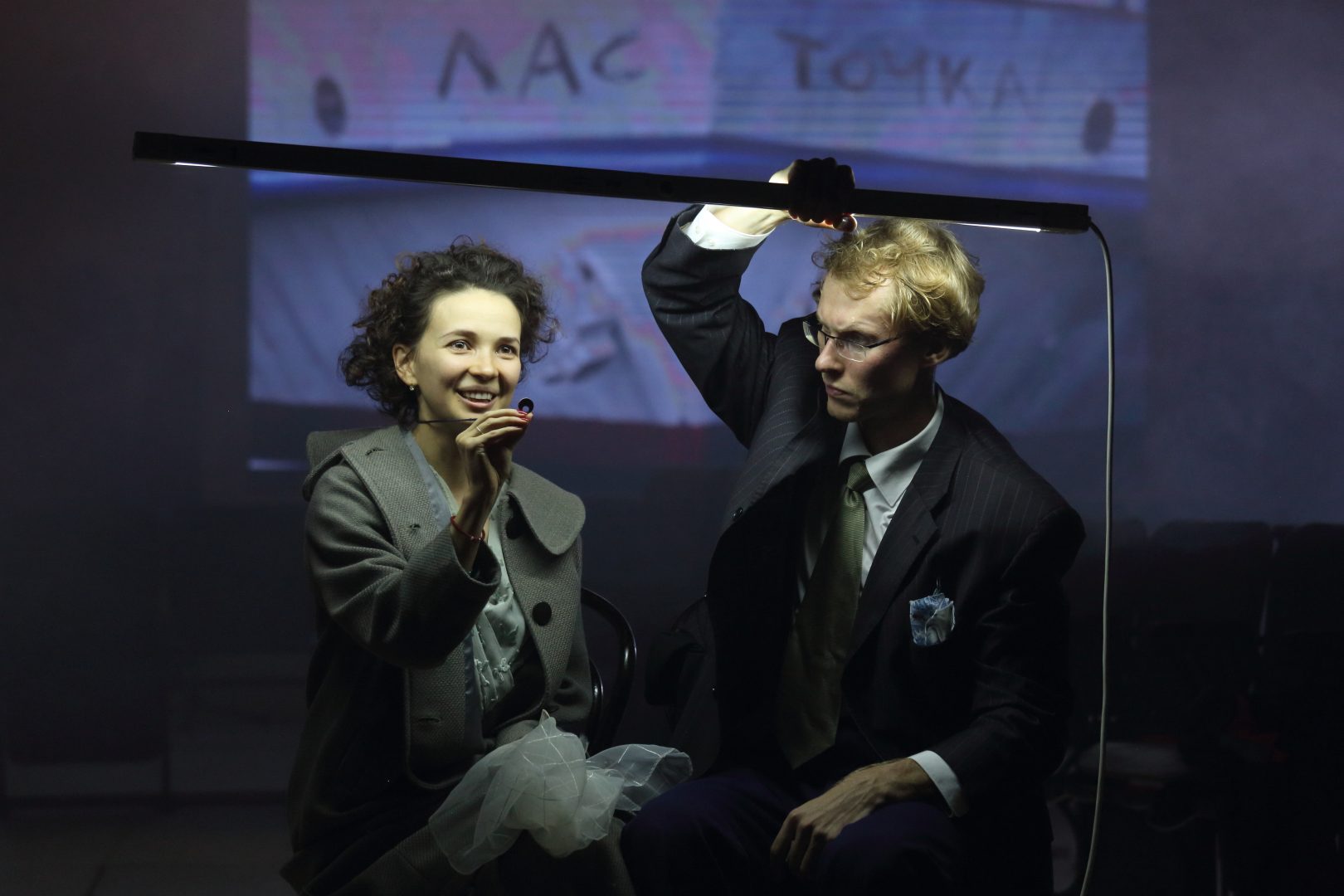During this year’s “Kontakt” International Theatre Festival, Dmitry Krymov’s Lab (based in the “School of Dramatic Art” theatre in Moscow) performed their interpretation of “Without a Dowry”. It received two awards: the Best Director (Dimitry Krymov) and the Best Female Actor (Maria Smolnikova as Larissa Dmitrievna).
The text written by Alexander Ostrovsky in 1878, on which the play is based, belongs to the classics of Russian realist drama. It was inspired by a real case of murder from jealousy. In what seems rather anachronistic – whoever uses the word “dowry” in everyday conversations anymore? – we can find, in fact, a lot of contemporary motives. In one of the scenes two man – rich goat Knurov (Konstanin Mukhanov) and Larrissa’s childhood friend Vozhevatov (Vadim Dubrovin) – tossed a coin in order to determine which one will “take care” of the abandoned, hopeless girl. Even though the position of women has changed a lot since the 19th century, we can easily imagine a similar situation happening today. A lot of other themes – including a complex dynamics of a mother-daughter relationship, a marriage of convenience (and out of desperation), a naivety caused by desire, a moral destruction of a weaker character by a stronger one – remain common problems and anxieties of people living in the 21st century. This timelessness was reflected by an indefinite time of action of the Krymov’s play: in one moment, actors remind us that there were no telephones at that time, in another – they casually watch television.
A good story would be nothing but empty words without equally good actors to breathe life into it. The Best Female Actor award for Maria Smonikova came as no surprise: her acting was moving and authentic, making it easy to sympathise with Larissa. Her face and gestures reflected perfectly a full range of emotions: from withdrawal, through hope, to despair. The rest of the cast didn’t fall behind at all. To name one example, Sergey Melkonyan perfectly impersonated Larissa’s mother, Kharita Ignatyevna. He showed us authentically the determination of a mother fighting for her daughter’s own good, even against the will of the latter. An interesting example of this difficult love was a brawl between Kharita Ignatyevna and Larissa’s unfulfilled love, Sergey Paratov (Georgy Tokaev).
What gave me the most delight was observing how actors interact with rather unusual scenography by Anna Kostrikova. An excessive amount coats, as it was falling down in due course, was scrupulously hung back by actors without interrupting the play. The cast was also using fluorescent tubes as props which added an original flavour to their dialogues. It’s impossible not to mention the screen on the middle wall. It was displaying, among other things, parts of the plot happening outside or in other rooms. Thanks to that, we could feel the dominant presence of Paratov long before he arrived in town, or observe Larissa’s frantic preparation for a new life at her true love’s side. All of that, along with rows of chairs and steam coming out of a wall, situated the events in a space as unobvious as its time.
Another pleasant detail was a skilfully led interaction between actors and audience. Krymov didn’t merely brake the so-called fourth wall: he went a step further and gently engaged the audience into being a real part of the play. Most importantly, they could share the responsibility for the progression of events as they lent Larissa a lighter and a coin. They were also invited as guests to Karandyshev’s (Maxim Maminov) party where they were even offered some champagne. All of that happened without intimidating people by putting them on stage or demanding a loud answer – both of which tend to happen during different performances.
The play wouldn’t have been be the same without music. Most of the audience’s attention seemed to be focused on “Ne me quitte pas” performed on accordion by Robinson (Alina Khodzhevanova). I, for change, was much more charmed with the main subject of Jun Miyake’s “Alviverde”. Although it hardly strikes one as the first choice for a 19th century Russian drama, in reality it suited the play perfectly and gave it an unique, unforgettable vibe.
During “Kontakt” ITF, the Dmitry Krymov’s Lab had its first occasion to perform “Without a Dowry” outside Russia. It was quite a challenge for an international audience: Ostrovski’s text, very popular in Russia, is not necessarily read in other countries. Therefore, the festival’s audience may have lost some part of the context. There’s also an everlasting problem of translation: even though its level was really high, it’s never possible not to lose the more subtle part of the original message. This potential obstacles didn’t influence the fact that the audience watched the play with pleasure and vivid emotions.
“Without a Dowry” was my first real contact with Russian drama. It made me regret deeply how limited my interaction with the Russian culture was so far, and encouraged me to change that. Although I can’t completely agree with Dimitry Krymov – who was persuading us after the show that two good plays are sufficient to unite the world – I certainly can admit that one good festival can bring closer two worlds which so far perceived each other as distant and incomprehensible.
[fot. Natalia Cheban, festival’s press release]
Text written by Agata Drozd and edited by Patryk Przybyłowski.

